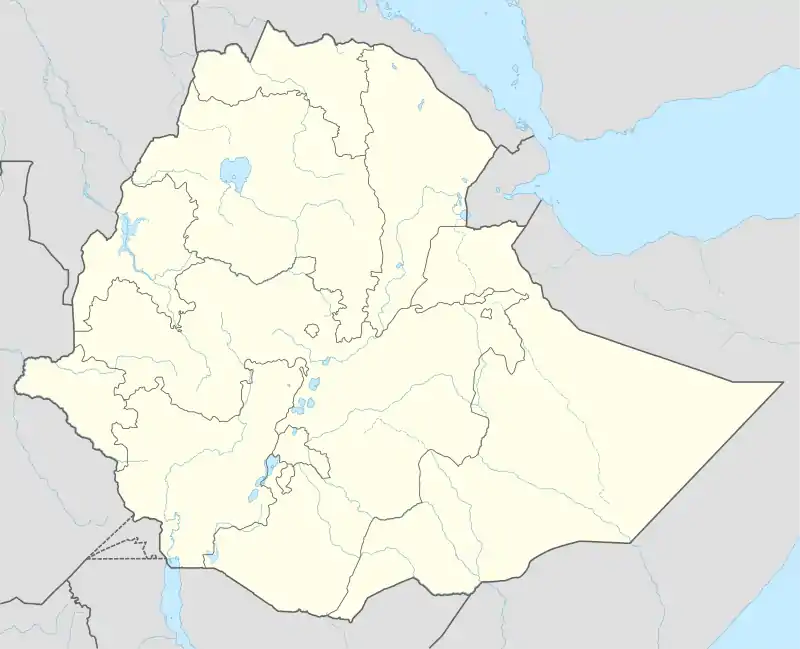Bedele
Bedele (also called Buno Bedele) is a town and separate woreda in south-western Ethiopia. Located in the Buno Bedelle Zone of the Oromia Region, this town has a longitude and latitude of 8°27′N 36°21′E and an elevation between 2,012–2,162 metres (6,601–7,093 ft) above sea level.
Bedele | |
|---|---|
 Bedele Location within Ethiopia | |
| Coordinates: 8°27′N 36°21′E | |
| Country | |
| Region | Oromia |
| Zone | Illubabor |
| Population (2007) | |
| • Total | 19,517 |
| Time zone | UTC+3 (EAT) |
| Climate | Cwb |
History
Ras Tessema Nadew made his capital near Bedele in the early 1900s. Henry Savage Landor passed through the town in 1906.[1] The map attached to C. W. Gwynn's account of his 1908/09 triangulation survey of southern Ethiopia shows that Bedele had a telegraph station, connected by way of Gore.[2] The Buno Bedele Health Center was built in 1966 with a majority of Swedish donations.[1]
The road connecting Bedele to Agaro, 96 kilometres (60 mi) long, was completed in 1968 at a cost of 12 million dollars (Ethiopian), by the French company Razel Frères. Construction on a road to Metu began around 1970.[1]
In February 2009, Regional President Abadula Gemeda laid the cornerstone for a new cultural center in Bedele. At the same time, he officially opened the new technical and vocational college in the town.[3]
Bedele Brewery
Bedele is the headquarters for the Bedele Brewery.[4] Founded in 1993, Bedele is a formerly government-owned corporation, producing about 75 million bottles of beer each year for domestic and export customers; it was bought by Heineken in August 2011.[5]
Demographics
The 2007 national census reported a total population for Bedele of 19,517, of whom 9,837 were men and 9,680 were women. The majority of the inhabitants practised Ethiopian Orthodox Christianity, with 52.9% of the population reporting they observed this belief, while 24.98% of the population said they were Protestant, and 21.44% were Moslem.[6]
Based on figures from the Central Statistical Agency in 2005, Bedele has an estimated total population of 21,289 of whom 10,556 are men and 10,733 are women.[7] The 1994 census reported this town had a total population of 11,907 of whom 5,725 were males and 6,182 were females. 90% of the residents are ethnic Oromo.
Notes
- "Local History in Ethiopia" The Nordic Africa Institute website (accessed 16 November 2007)
- Gwynn, "A Journey in Southern Abyssinia", Geographical Journal, 38 (1911), pp. 113-139
- "Bedele to Get Cultural Center" Archived 2009-02-25 at the Wayback Machine, Ethiopian News Agency website, dated 22 February 2009 (accessed 14 April 2009)
- Bedele Brewery website
- Heineken and the famine: Refreshes the parts other beers cannot reach an August 18, 2011 blog post from The Economist
- 2007 Population and Housing Census of Ethiopia: Results for Oromia Region, Vol. 1 Archived November 13, 2011, at the Wayback Machine, Tables 2.1, 2.5, 3.4 (accessed 13 January 2012)
- CSA 2005 National Statistics Archived July 31, 2008, at the Wayback Machine, Table B.4